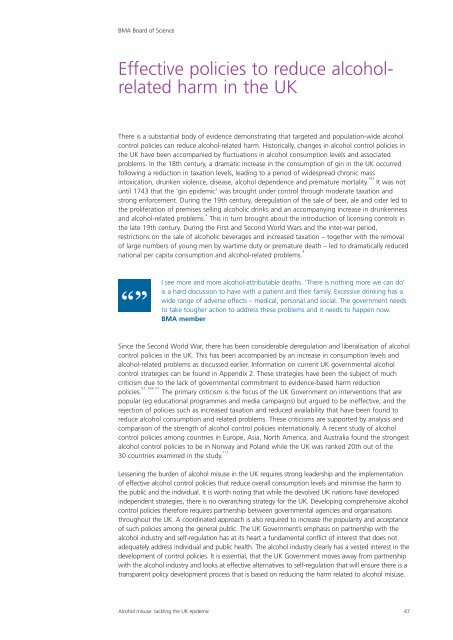Alcohol misuse: tackling the UK epidemic - London
Alcohol misuse: tackling the UK epidemic - London
Alcohol misuse: tackling the UK epidemic - London
Create successful ePaper yourself
Turn your PDF publications into a flip-book with our unique Google optimized e-Paper software.
BMA Board of Science<br />
Effective policies to reduce alcoholrelated<br />
harm in <strong>the</strong> <strong>UK</strong><br />
There is a substantial body of evidence demonstrating that targeted and population-wide alcohol<br />
control policies can reduce alcohol-related harm. Historically, changes in alcohol control policies in<br />
<strong>the</strong> <strong>UK</strong> have been accompanied by fluctuations in alcohol consumption levels and associated<br />
problems. In <strong>the</strong> 18th century, a dramatic increase in <strong>the</strong> consumption of gin in <strong>the</strong> <strong>UK</strong> occurred<br />
following a reduction in taxation levels, leading to a period of widespread chronic mass<br />
intoxication, drunken violence, disease, alcohol dependence and premature mortality. 103<br />
It was not<br />
until 1743 that <strong>the</strong> ‘gin <strong>epidemic</strong>’ was brought under control through moderate taxation and<br />
strong enforcement. During <strong>the</strong> 19th century, deregulation of <strong>the</strong> sale of beer, ale and cider led to<br />
<strong>the</strong> proliferation of premises selling alcoholic drinks and an accompanying increase in drunkenness<br />
and alcohol-related problems. 4<br />
This in turn brought about <strong>the</strong> introduction of licensing controls in<br />
<strong>the</strong> late 19th century. During <strong>the</strong> First and Second World Wars and <strong>the</strong> inter-war period,<br />
restrictions on <strong>the</strong> sale of alcoholic beverages and increased taxation – toge<strong>the</strong>r with <strong>the</strong> removal<br />
of large numbers of young men by wartime duty or premature death – led to dramatically reduced<br />
national per capita consumption and alcohol-related problems. 4<br />
“”<br />
I see more and more alcohol-attributable deaths. ‘There is nothing more we can do’<br />
is a hard discussion to have with a patient and <strong>the</strong>ir family. Excessive drinking has a<br />
wide range of adverse effects – medical, personal and social. The government needs<br />
to take tougher action to address <strong>the</strong>se problems and it needs to happen now.<br />
BMA member<br />
Since <strong>the</strong> Second World War, <strong>the</strong>re has been considerable deregulation and liberalisation of alcohol<br />
control policies in <strong>the</strong> <strong>UK</strong>. This has been accompanied by an increase in consumption levels and<br />
alcohol-related problems as discussed earlier. Information on current <strong>UK</strong> governmental alcohol<br />
control strategies can be found in Appendix 2. These strategies have been <strong>the</strong> subject of much<br />
criticism due to <strong>the</strong> lack of governmental commitment to evidence-based harm reduction<br />
57, 104-111<br />
policies. The primary criticism is <strong>the</strong> focus of <strong>the</strong> <strong>UK</strong> Government on interventions that are<br />
popular (eg educational programmes and media campaigns) but argued to be ineffective, and <strong>the</strong><br />
rejection of policies such as increased taxation and reduced availability that have been found to<br />
reduce alcohol consumption and related problems. These criticisms are supported by analysis and<br />
comparison of <strong>the</strong> strength of alcohol control policies internationally. A recent study of alcohol<br />
control policies among countries in Europe, Asia, North America, and Australia found <strong>the</strong> strongest<br />
alcohol control policies to be in Norway and Poland while <strong>the</strong> <strong>UK</strong> was ranked 20th out of <strong>the</strong><br />
30 countries examined in <strong>the</strong> study. 112<br />
Lessening <strong>the</strong> burden of alcohol <strong>misuse</strong> in <strong>the</strong> <strong>UK</strong> requires strong leadership and <strong>the</strong> implementation<br />
of effective alcohol control policies that reduce overall consumption levels and minimise <strong>the</strong> harm to<br />
<strong>the</strong> public and <strong>the</strong> individual. It is worth noting that while <strong>the</strong> devolved <strong>UK</strong> nations have developed<br />
independent strategies, <strong>the</strong>re is no overarching strategy for <strong>the</strong> <strong>UK</strong>. Developing comprehensive alcohol<br />
control policies <strong>the</strong>refore requires partnership between governmental agencies and organisations<br />
throughout <strong>the</strong> <strong>UK</strong>. A coordinated approach is also required to increase <strong>the</strong> popularity and acceptance<br />
of such policies among <strong>the</strong> general public. The <strong>UK</strong> Government’s emphasis on partnership with <strong>the</strong><br />
alcohol industry and self-regulation has at its heart a fundamental conflict of interest that does not<br />
adequately address individual and public health. The alcohol industry clearly has a vested interest in <strong>the</strong><br />
development of control policies. It is essential, that <strong>the</strong> <strong>UK</strong> Government moves away from partnership<br />
with <strong>the</strong> alcohol industry and looks at effective alternatives to self-regulation that will ensure <strong>the</strong>re is a<br />
transparent policy development process that is based on reducing <strong>the</strong> harm related to alcohol <strong>misuse</strong>.<br />
<strong>Alcohol</strong> <strong>misuse</strong>: <strong>tackling</strong> <strong>the</strong> <strong>UK</strong> <strong>epidemic</strong> 47
















